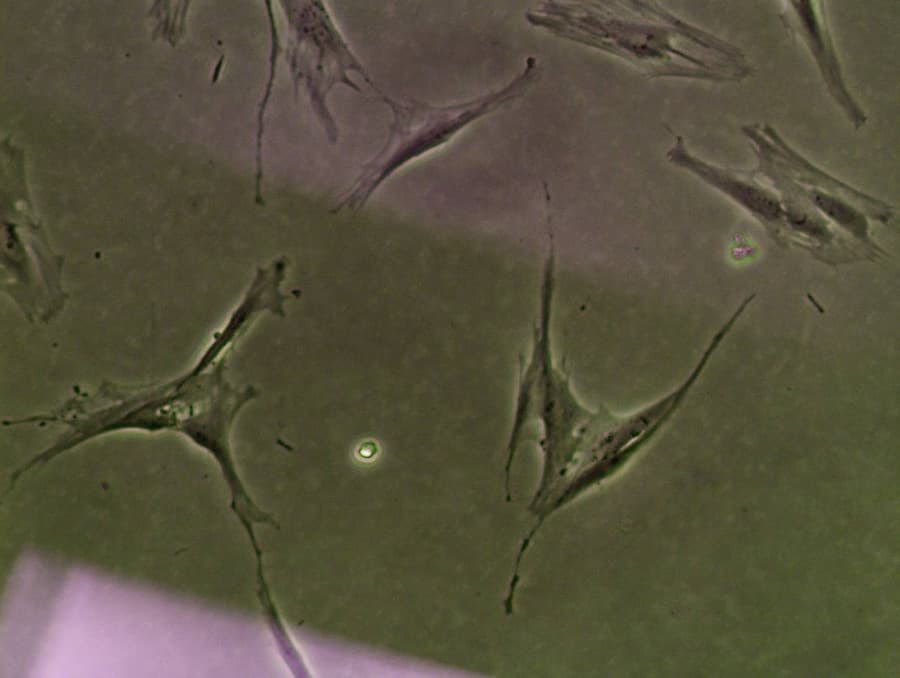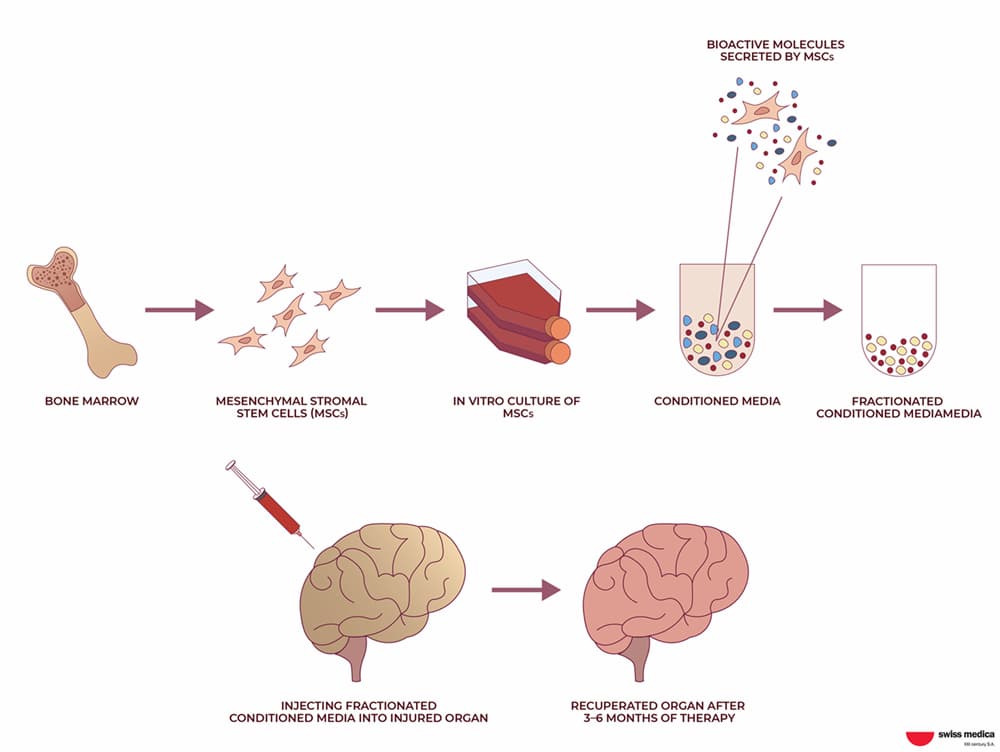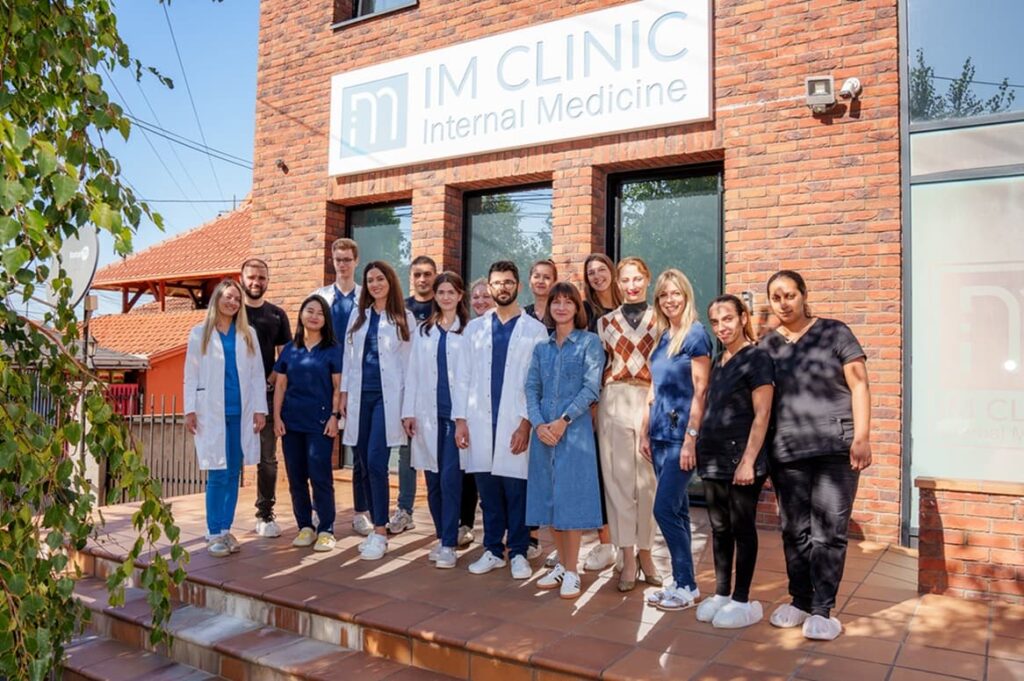Mesenchymal stem cell therapy is an advanced approach in regenerative medicine that harnesses the body’s natural ability to heal and repair itself. This innovative treatment uses specialized cells known as mesenchymal stem cells (MSCs) to address various health challenges.
In this article, we will answer the question, “What is mesenchymal stem cell therapy?” and explore in detail how it works and who can benefit from it the most.
What Is Mesenchymal Stem Cell Therapy?
Mesenchymal stem cell therapy refers to the use of mesenchymal stem cells (MSCs) to manage a wide range of health conditions. Let’s clarify the mesenchymal stem cell definition. These are multipotent cells that can be derived from different sources and have the ability to differentiate into various cell types, such as muscle, cartilage, or neural cells. In a laboratory setting, they can be directed to differentiate into cells that produce tissue-specific healing substances tailored to repair particular tissues.

Sources of Mesenchymal Stem Cells
Human mesenchymal stem cells (MSCs) are found in many types of tissues and can be derived from several sources:
| Donor cells (allogeneic) | The patient’s own stem cells (autologous) |
| This type of cell is derived from the umbilical cord or placenta tissue. Cells are harvested only after a healthy childbirth or from authorized banks, ensuring the highest quality and safety for our patients. | These cells can be derived from bone marrow, adipose or intestinal tissue. The production of a cell product from autologous material takes 3–4 weeks. |
Once isolated and prepared, they are introduced into the body to stimulate regeneration processes.
How Does Mesenchymal Stem Cell Therapy Work in the Body?
When injected or infused, MSCs migrate to damaged areas, where they start action through different paracrine mechanisms.
| Promote regeneration | By releasing bioactive molecules, MSCs activate the patient’s own body stem cell pool, which promotes differentiation. Cytokines and growth factors are substances released by stem cells that stimulate other cells to divide and grow and encourage tissue repair. |
| Enhance neoangiogenesis | Stem cells stimulate tissues to form new blood vessels. This aspect provides better tissue nutrition. |
| Immunomodulation | Mesenchymal stem cells have unique properties to reduce inflammation and inhibit immune responses that could cause tissue damage. This makes them a promising option for the management of chronic conditions and injuries. |
What Conditions Can Mesenchymal Stem Cell Therapy Help With?
Mesenchymal stem cells possess distinctive characteristics that make them a promising candidate for the regulation of a broad spectrum of conditions. In addition to their potential application as a supplement to conventional therapeutic interventions, these cells have demonstrated encouraging outcomes in various clinical settings.
Neurological Disorders
MSCs can modulate the immune system and improve neuromuscular conduction, potentially slowing the progression of neurological disorders and neurodegenerative conditions. Stem cells can greatly improve the quality of life and symptom control in these patients.
Multiple Sclerosis
Multiple sclerosis is a chronic, progressive neurological condition that leads to the destruction of the protective layer of nerves—myelin and neuronal loss.
For individuals living with multiple sclerosis, mesenchymal stem cell treatments for MS may offer hope by targeting the underlying causes due to their ability to modulate immune responses. Neuroprotective properties can promote myelin repair and regeneration.
Parkinson’s
A neurodegenerative condition that primarily affects the central nervous system and can affect both the motor and non-motor systems, accompanied by loss of dopaminergic neurons.
Patients could benefit from stem cell treatment for Parkinson’s due to its ability to regenerate neurons and improve motor function.
Stroke Recovery
During a stroke, the blood supply to the brain is disrupted, causing cells to die, and the person may lose many functions.
Stroke treatment with stem cells works by reducing neuroinflammation, promoting tissue repair, and supporting brain recovery, ultimately improving functional outcomes by enhancing neural connectivity.
Get a free online consultation
Only a regenerative medicine specialist can determine if stem cell therapy may be beneficial for you. If you’d like a free evaluation of your case, book a consultation with our experts today.

Medical Advisor, Swiss Medica doctor
How Do Mesenchymal Stem Cells Work for Autoimmune Conditions?
Autoimmune conditions are a process where the immune system begins to reject the body’s own tissues. By regulating the immune response and immunomodulation, mesenchymal stem cells (MSCs) hold potential for alleviating symptoms of autoimmune disorders.
Rheumatoid Arthritis
Rheumatoid arthritis (RA) is an autoimmune condition that primarily affects the joints. It causes chronic inflammation, pain, swelling, and stiffness.
MSC-driven tissue repair and immune modulation can help with managing these symptoms.
Crohn’s Disease
It is a type of inflammatory bowel disease (IBD) that causes digestive inflammation.
Patients suffering from Crohn’s disease might experience reduced inflammation and improved gut health after mesenchymal stem cell treatment.
Lupus
Systemic lupus erythematosus (SLE) is a chronic autoimmune condition where the immune system mistakenly attacks various organs and tissues such as the skin, joints, kidneys, and heart.
This condition may respond positively to mesenchymal stem cell therapy for lupus, which helps balance immune activity and increase overall multi-system health.
Cardiovascular and Pulmonary Conditions
As with the conditions described above, mesenchymal stem cells can be used to treat some of the most important organs in the human body—the heart and lungs. MSCs contribute to heart and lung health by enhancing metabolism and reducing inflammation and fibrosis.
Heart Failure
Mesenchymal stem cells help with managing heart failure. Promoting regeneration can improve muscle structure and pumping ability. The immunomodulatory effect of MSCs prevents tissue remodeling.
Chronic Obstructive Pulmonary Disease (COPD)
Chronic Obstructive Pulmonary Disease (COPD) is a chronic disease that causes inflammation, resulting in tissue damage and airway obstruction with abundant mucus.
Stem cell therapy for COPD may be useful in reducing inflammation and improving lung function and quality of life.
Pulmonary Fibrosis
Pulmonary fibrosis is a chronic condition in which, for various reasons, lung tissue is replaced by fibrotic tissue that looks like a scar and cannot function. MSCs show significant potential to reduce scarring in lung tissue.
Orthopedic and Joint Conditions
From osteoarthritis to tendon injuries, mesenchymal stem cell applications improve the quality of life for these patients, primarily by regenerating damaged tissue, helping to rebuild cartilage, and accelerating recovery. As a result, their mobility increases, and they can return to their normal lifestyle.
Benefits and Potential of Mesenchymal Stem Cell Therapy
Mesenchymal stem cells in regenerative medicine show the potential to manage a wide range of health conditions through their ability to stimulate natural healing and tissue regeneration.
For example, research has shown that MSCs are able to secrete potent anti-inflammatory cytokines and growth factors such as IL-10 and TGF-β that inhibit inflammation and promote nerve repair. MSCs also participate in neuroprotection by secreting neurotrophic factors such as brain-derived neurotrophic factor (BDNF) and nerve growth factor (NGF), which promote neuronal survival and function. In practical terms, this means that they may provide long-term relief to patients with debilitating pain or mobility problems.
More research is needed to explore the full potential of MSCs, but early results suggest that this approach may soon be a cornerstone of modern regenerative medicine. It’s not just about managing symptoms; it’s about empowering the body to heal itself in ways we’re only beginning to understand.
Natural Healing Without Surgery
One of the most appealing aspects of MSC therapy is its non-surgical nature, offering a less invasive alternative to traditional treatments. For some conditions, treatment is possible even without injections.
Potential for Tissue Regeneration and Repair
Stem cells cannot completely regenerate organs and tissues, but by acting on the cells of the patient’s body, it may be possible in part. Assisting in regeneration and improving the quality of life is the main benefit of stem cell therapy.
Anti-Inflammatory and Immunomodulatory Effects
By soothing overactive immune reactions and suppressing inflammation, MSCs open the door to long-term wellness.
Mesenchymal Stem Cell Therapy vs. Other Stem Cell Treatments
| Embryonic stem cells | Adult mesenchymal stem cells |
| Derived from embryonic tissue in the early stages of development. | Isolated from various formed tissues: placenta, umbilical cord, adipose tissue, etc. |
| Have the ability to form tumors. | No tumorigenic activity. |
| Not used in many countries for ethical, social, and legal reasons. | Actively used in regenerative medicine. |
How Is MSC Therapy Performed?
Stem cells can be administered using various methods, depending on the condition being treated. These methods range from intravenous injection into the systemic bloodstream to topical application in cream form.

The Treatment Process Step by Step
At Swiss Medica, we prioritize safety and individualized attention at every stage of mesenchymal stem cell therapy. This process is carefully designed to ensure optimal results, combining cutting-edge science with a holistic approach to patient well-being.
Free online consultation
During your initial consultation with our regenerative medicine specialist, the doctor will discuss your medical history and the condition for which you are seeking treatment and will create an individualized treatment plan for you.
Pre-transplant preparation
Before treatment, patients undergo a thorough medical evaluation that may include:
- Blood tests (CBC, blood chemistry, infectious disease screening)
- Cardiac evaluation (ECG, echocardiogram)
- Organ function tests
If stem cell therapy is not appropriate, other treatments can be suggested.
Stem cell administration
Stem cells undergo rigorous safety checks before administration. Common methods include:
- Intravenous injection into bloodstream
- Mesenchymal stem cell injections into specific area
- Intrathecal mesenchymal stem cell injections into spinal canal that contain cerebrospinal fluid
- Inhalation
- Topically mesenchymal stem cells applications
The procedure is minimally invasive, and the patients are monitored for vital signs throughout.
Recovery time and results
Recovery time is typically a few days, with follow-up care for months. Some benefits can be seen shortly after treatment, with full effects taking weeks or months to appear. Long-term effects of human mesenchymal stem cells last for 3–6 months, although the therapeutic effects may persist after this duration.
Choosing the Right Clinic for Mesenchymal Stem Cell Therapy
There are many factors to consider when choosing a clinic. The experience of the clinic, the expertise of the doctors, and the feedback from patients are, of course, key factors. However, an important factor will also be the cost of therapy and the expenses related to staying in the country when patients consider treatment abroad.
When comparing the total cost of mesenchymal stem cells in the UK and Serbia, we can see significant differences.
Swiss Medica, located in Belgrade, Serbia, offers more favorable conditions for your stay. Our doctors have a high international qualification; we use modern medical equipment and have an in-house laboratory. Due to the low cost of living compared to Western Europe and the USA, mesenchymal stem cell therapy cost in Serbia is a favorable yet quality choice.

How Much Does Therapy with Mesenchymal Stem Cells Cost?
The mesenchymal stem cell therapy cost varies based on factors like location, clinic reputation, and the complexity of the procedure. On average, at Swiss Medica, mesenchymal stem cell prices range from €7,000 to €31,000* for a full course of management.
*The prices mentioned are indicative and subject to change based on individual factors, including the condition’s severity and the number of stem cells needed. Prices are valid as of January 2025.
Risks and Limitations of MSC Therapy
While generally safe, MSC therapy carries some side effects, such as mild swelling or pain. Additionally, a history of cancer is a limitation to therapy. Consulting a qualified specialist is essential before proceeding.
Frequently Asked Questions About Mesenchymal Stem Cell Therapy
1. Are there any side effects?
Side effects are rare but may include mild swelling or bruising at the injection site.
2. Is MSCs therapy painful?
Most patients report minimal discomfort during the procedure. Local anesthesia may be performed as needed.
3. How do mesenchymal stem cells work?
Mesenchymal stem cells have the property of differentiating into various special tissue cells, but the main therapeutic effect is achieved through paracrine effects on the body’s own stem cells and anti-inflammatory effects.
4. Can I undergo MSC therapy?
While suitable for many, certain conditions may preclude eligibility. Consultation with a physician is recommended.
Contact us
Find out if MSC therapy is right for you—schedule a consultation with our regenerative medicine specialists today.

Medical Advisor, Swiss Medica doctor
List of References
Kataria S, Inggas MAM, Patel U, Wijaya JH, Yabut K, Ayub MA, Maniyar P, Upadhyay N, Davitashvili B, Patel J, Shah S, Turjman T, Turjman H, Shekoohi S, Kaye AD. A Systematic Review and Meta-Analysis of Stem Cell Therapies for Pain in Diabetic Neuropathy, Osteoarthritis, and Spinal Cord Injuries. Curr Pain Headache Rep. 2025 Jan 22;29(1):29. doi: 10.1007/s11916-024-01331-6. PMID: 39841308.
Musiał-Wysocka A, Kot M, Majka M. The Pros and Cons of Mesenchymal Stem Cell-Based Therapies. Cell Transplant. 2019 Jul;28(7):801-812. doi: 10.1177/0963689719837897. Epub 2019 Apr 24. PMID: 31018669; PMCID: PMC6719501.
Jovic, D., Yu, Y., Wang, D. et al. A Brief Overview of Global Trends in MSC-Based Cell Therapy. Stem Cell Rev and Rep 18, 1525–1545 (2022). https://doi.org/10.1007/s12015-022-10369-1
Shobha Regmi, Shiva Pathak, Jong Oh Kim, Chul Soon Yong, Jee-Heon Jeong,
Mesenchymal stem cell therapy for the treatment of inflammatory diseases: Challenges, opportunities, and future perspectives,
European Journal of Cell Biology, 2019,151041,ISSN 0171-9335, https://doi.org/10.1016/j.ejcb.2019.04.002. https://www.sciencedirect.com/science/article/pii/S0171933519300378
Hmadcha Abdelkrim , Martin-Montalvo Alejandro , Gauthier Benoit R. , Soria Bernat , Capilla-Gonzalez Vivian. Therapeutic Potential of Mesenchymal Stem Cells for Cancer Therapy. Frontiers in Bioengineering and Biotechnology, 2020.
https://www.frontiersin.org/journals/bioengineering-and-biotechnology/articles/10.3389/fbioe.2020.00043 DOI=10.3389/fbioe.2020.00043 ISSN=2296-4185
Asma Alanazi, Mohammad Alassiri, Dunia Jawdat, Yaser Almalik, Mesenchymal stem cell therapy: A review of clinical trials for multiple sclerosis, Regenerative Therapy, 2022,ISSN2352-3204,https://doi.org/10.1016/j.reth.2022.07.003 https://www.sciencedirect.com/science/article/pii/S2352320422000669
MD, Pediatrician, Regenerative Medicine Specialist







